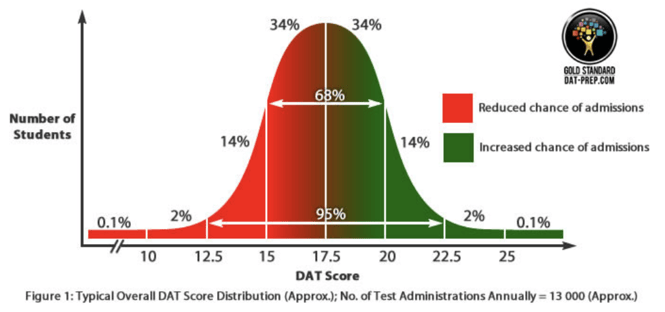
Now that you have taken most of the prerequisite courses for dental school, it is important to start thinking about taking the Dental Admissions Test (DAT). In this blog, I will be giving you some objective, important details about the test and also my own personal experience taking the DAT.
The DAT exam
The DAT is composed of four components (280 total multiple choice questions,5 hrs), each of which is also broken into different subcategories:
- Survey of Natural Sciences (100 questions, 90 mins)
- Biology (40)
- General chemistry (30)
- Organic chemistry (30)
- Perceptual ability (90 questions, 60 mins)
- Reading comprehension (50 questions, 60 mins)
- Quantitative reasoning (40 questions, 45 mins)
There is a 15 min optional break in between the perceptual ability portion of the exam and the reading comprehension. I highly recommend that you take this break, walk around the building, and shake off the tension in your body. Make sure to bring sweet treats that you have access to such as dates, almonds, raisins, and fruits.
When to take the exam:
There is no right time to take the DAT, however, make sure that you have taken the right courses that would prepare you for the exam. I took the DAT the summer after my sophomore year of college due to various personal reasons, such as intending to study abroad in Spain my junior year and already finishing the science courses that are represented on the DAT. However, most students take the DAT over the summer before applying during their junior or senior year, during their winter breaks, or any other time they have the time to dedicate to studying and practicing. If you have already graduated, you may have more flexibility when it comes to the timing of the exam.
It’s important to reserve a period of time for preparing for the examination because it would be the most cost-effective, time-saving manner to go about taking the DAT.
When you feel as though you’re way more excited to take the DAT and get it over with, than you’re anxious about the exam, that’s the golden time. when you know you are ready.
Scores:
Although I recommend that you take the exam when you feel fully ready, it’s also important to point out that IT IS OKAY if the first take did not go as planned. You can learn from your past experiences and pick up the tabs and take the exam again. There is no shame in failing as long as you’re ready to get right back on your feet.
The DAT is not a pass/fail exam and the aim is to score as high as possible. The scores range from 1 (lowest) to 30 (highest). Unanswered questions and wrongly answered questions count the same, so ALWAYS answer all questions and make educated guesses. The graph below shows the distribution of scores and their correlative percentile. These percentiles fluctuate exam to exam and the percentiles are not necessarily used by dental school admission officers.

You will receive your raw score immediately after the exam so you will have a reliable estimate on how you performed on the exam.
Sending your scores:
When you are completing the registration, you will be asked if you would like to report your scores to any/all dental schools. Personally, I reported my score to AADSAS participating schools because the fee was already included in the registration. I would recommend reporting the score, however, if you would rather pay the additional fee afterwards to report the score, that is also a possibility.
Costs:
The exam itself and prep materials are quite expensive so I always recommend students to take as much time needed to prepare for it and ensure that they feel prepared before they take the exam. The cost of the exam is around 445 dollars and prep material can range anywhere from 20-1000 dollars. Furthermore, it’s essential to seek out for one-on-one tutoring if you’re a student who benefits from having an experienced person who has taken the exam before. Cambridge Coaching has great options available for you!
Testing accommodations:
If you need to be accommodated for the exam, you can indicate that when you are registering for the DAT. Often, you will have control over the timer and can take the test at your own pace.
Registering for the DAT:
To register for the DAT, go to American Dental Education (ADA) website and obtain the DENTPIN, which is a personal identifier (as explained on the website). The test can be taken at indicated prometric centers and you can call to arrange the date, time, and location.
Make sure to take two forms of IDs and your admission ticket to the prometric center and they will check you in by fingerprinting and taking your picture.
For more information:
Visit American Dental Association for more information and read their DAT guide, which answers most frequently asked questions.
This blog is a quick overview of the DAT and the process to take it. Please do not hesitate to contact me and I will be more than happy to chat with you and give you more personal insights. It may seem like a hard road ahead, but I promise that with the right mentality and work ethic, you will get to your desired destination.
Want to browse some of the science sections of our blog?

Comments